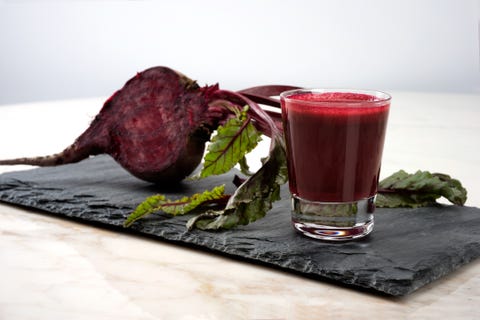You may have heard of nitric oxide supplements, which claim to increase workout performance and boost your productivity in general. You might even find some inside your pre-workout formulas too.
What is nitric oxide?
“Nitric oxide is a gas that the body produces, and it helps with blood flow. Nitric oxide supplements try to increase the amount of nitric oxide in your blood, which might help increase blood flow to working muscles and help reduce time to fatigue during a workout,” says Natalie Rizzo, M.S., R.D.

(To be clear, nitric oxide is very different from nitrous oxide, a.k.a. the stuff that gets you high in whip-its.)
What are nitric oxide supplements supposed to do?
In theory, nitric oxide supplements could do wonders for your fitness routine. But what does science actually say?
Nitric oxide supplements don’t actually contain nitric oxide. Instead, they contain ingredients (or substrates) that are thought to give your body a nudge to produce more nitric oxide, such as L-arginine and L-citrulline.
While the L-arginine in your body is involved in nitric oxide production, research is mixed as to whether taking it in supplement form will increase nitric oxide production, and if it could, whether that would actually enhance exercise performance and improve health, Jones says.
If you’re looking to still give nitric oxide a try, here’s what you should know.
It could boost blood flow to your muscles
Nitric oxide is a gas that’s made by your body, and one of its primary purposes is to promote vasodilation, or increased blood flow.
Because blood is responsible for carrying oxygen to working muscles, the reasoning is that the increased blood flow caused by taking nitric oxide supplements might help you work out for a longer period of time and speed up recovery time. Proponents also claim that increased blood flow might increase the “pump’” of your muscles, or how large or pronounced they look (because they’re literally engorged with blood).
It could help you last longer in bed
In the body, “nitric oxide is secreted by the endothelial cells, which line the inner walls of the blood vessels, and it communicates with the smooth muscle cells, triggering them to relax,” explains Nathan Jenkins, Ph.D., an assistant professor in the Department of Kinesiology at the University of Georgia. This blood flow regulation plays a role in multiple body functions, including maintaining erections and controlling blood pressure.
“Nitric oxide itself does play a role in initiating and sustaining erections in males, but there are many other factors involved,” says Jones. It may increase blood flow to the penis, which can help a man maintain his erection, adds Rizzo, so for that reason, it could increase performance in bed and help you go longer.
A recent study did show that L-arginine supplements might enhance the effects of a common erectile dysfunction drug, but studies on people without dysfunction is limited, so general benefits aren’t totally known.
OK, but do nitric oxide supplements actually work?

Honestly, we don’t really know. There’s simply not enough evidence to suggest that they do.
“[The idea is that these supplements] will increase NO, and then because of that, it’ll cause vasodilation, and then the downstream effect of vasodilation would be this massive increase in blood flow, which leads to increased exercise performance and enhanced recovery,” says Richard Bloomer, Ph.D., dean of the School of Health Studies and The Center for Wellness and Fitness at the University of Memphis. “But most, if not all, of [these purported benefits] have not been supported by available evidence.”
In studies that have shown a link between improvements in performance and nitrate levels in the blood, such positive results could simply be a result of extensive training, as exercise itself enhances nitric oxide activity. Plus, dietary nitrate comes from other sources, like vegetables, and most studies don’t control for this.
Even if there are benefits to nitric oxide supplementation, it’s unclear whether they would apply to everyone. A review of 42 studies related to the effects of dietary ingredients linked with nitric oxide and exercise performance found mixed results: the review concluded that while nitric oxide supplements may “improve tolerance” to aerobic and anaerobic exercise in people who either aren’t in shape or are moderately trained, there seems to be no benefit in highly trained people.
Are nitric oxide supplements safe?

When taken in relatively low amounts, there aren’t any side effects associated with NO supplements. Though the jury’s out on whether nitric oxide supplements really do improve performance, Bloomer says if you want to try them at a low dosage, go ahead. That said, if you’re prone to hypotension (or low blood pressure), you might want to skip them, as they could leave you feeling lightheaded or dizzy.
“It’s also important to note that many booster supplements may contain additional ingredients that are not well researched or well regulated, so safety and efficacy can easily be questioned,” she adds.
Jenkins also notes that high dosages of nitric oxide supplements could put your kidney function at risk, particularly if you already have a nitrate-heavy diet. In such cases, “it might actually cause a reduction in performance, because your kidneys are stressed out and trying to process all this extra nitrate,” says Jenkins. To be on the safe side, don’t take anything more than what’s instructed on the package.
Is nitric oxide bad for your liver?
“While research isn’t conclusive, the answer to this may depend on whether you’re ingesting high amounts of synthetic nitrates and nitrites from processed meats or eating nitrates naturally from vegetables,” says Jones.
The World Health Organization and American institute for cancer research advise against any intake of processed and cured meats, and most contain sodium nitrates and nitrites. “Some research has linked sodium nitrates to free radical damage to cells including those in the liver, however much of this research has been conducted on animals with human studies being based on correlation rather than causation,” she says.
Can you take nitric oxide supplements daily?

That depends on which for you take it.
Consuming nitrates through food is totally encouraged. The research on beet juice (which is full of nitric oxide) and beet powder shows the best success in improving exercise performance and heart health with daily consumption of at least 2 weeks, explains Jones. “Nitrate content may be an additional reason high vegetable intake is associated with better heart health, too,” she says.
When it comes to supplements containing ingredients other than pure beet or vegetable powder, you want to be careful. Supplements are not well regulated for safety, purity, potency or effectiveness of claims, so if you do choose another “nitric oxide booster” pick one that is third party tested, preferably by NSF for Sport or Informed Choice for Sport.
Rizzo doesn’t think you should supplement daily. “I wouldn’t recommend it. There isn’t much research on these supplements, so it’s difficult to assess what the long term side effects might be,” she says. Instead, eat vegetables or beetroot to get your nitric oxide.
What foods are high in nitric oxide?

Looking for a way to increase nitric oxide naturally? Try these foods.
Beets
Most notably, beetroot juice is full of nitric oxide, and there is research to show that drinking it before competition can help with performance. “One study found cyclists who drank beetroot juice two to three hours before exercise increased peak power and pedaling velocity. Another review also shows that beetroot juice can increase overall endurance and power for athletes,” says Rizzo.
“Beets are the highest dietary source of nitrates, which are converted into nitric oxide in the body. Because of their natural nitrate content and its ability to convert to nitric oxide so well, beets have been shown through many studies to support the heart, especially by improving blood pressure,” says Jones.
“Beets are also linked to other nitric oxide benefits, including improvements in both increasing strength and endurance performance as well as improvements in cognition during exercise, lower inflammation levels, greater antioxidant function, improved cognition, and more,” she says.
Leafy greens
It is also found in leafy greens and other vegetables, just in smaller amounts. Vegetables are rich in nitrates, and high nitrate intake is associated with higher nitric oxide levels in the body, so get in those greens. “That is, so long as you have a healthy oral microbiome. Regular use of antibacterial mouthwash actually kills the bacteria that aid in production of nitric oxide from nitrates (and may impact the bacterial balance in your lower digestive tract),” Jones says.
As for vegetables with the highest nitrite content, beets are top of the list, as well as celery, chard, watercress, lettuce, spinach, and arugula. The next group with the greatest amount includes cucumber, celeriac, Chinese cabbage, endive, fennel, kohlrabi, leeks, and parsley.
Source: Read Full Article
